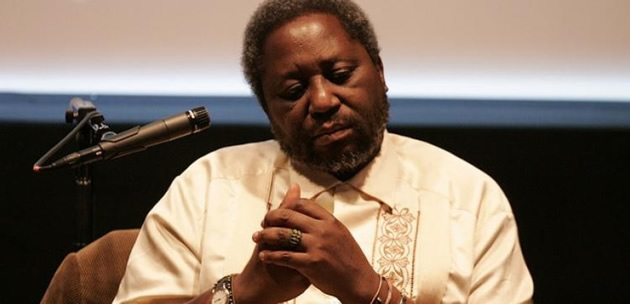The simplicity of Hove’s poetry

Tanaka Chidora Literature Today
“Poetry is a way of laughing and smiling,” (Chenjerai Hove, 2003).
The past two weeks have seen me reading a lot of poetry. At one point, I found myself holding Memory Chirere’s “Bhuku Risina Basa”; David Mungoshi’s “Live like an Artist” and Chenjerai Hove’s “Blind Moon”. I even read Chirere’s poem, “Pikicha” alongside Mungoshi’s “Stories from my Picture Album”. The result was aesthetically rewarding, I have to admit.
The simplicity of these poems reminded me of Hove’s “Blind Moon”, a very small book competing for space on a somewhat crowded bookshelf that belongs to me. This small collection of simple poems was published in 2003 by Weaver Press, so you might want to give them a ring after this review.
One of my utmost wishes when I came to Harare in the 2000s was to meet Hove whose works I had encountered when I was still a snot-faced and frightened Form One pupil in my village.
When fortune finally brought me to Harare, the city that had enticed me in my dreams for more than a decade, Hove had vacated Harare. I waited and waited, and peeped at the corners of his mind through the great works he had written like “Up in Arms” (1982), “Red Hills of Home” (1984), “Bones” (1988), “Shadows” (1991), “Ancestors” (1997), “Rainbows in the Dust” (1997), among many others.
My fascination with Hove’s writings is so strong that academically, I have published one article on the novel “Bones” and have submitted two more articles for publication on the same novel! Every time I hold “Bones”, I think of Marita whose voice (an amalgamation of the oral storyteller whom we call the Sarungano, Mbuya Nehanda and Hove himself) delivers very simple but deep philosophies of life. My favourite comes out through the reminiscences of Janifa when she says, “Marita, you are the one who told me the earth breathed so I should not put dirt all over the place.
“The trees, the rocks and the soil, you said once talked like people, they ran races and gave each other prizes . . . Now that you are dead, Marita, who will tell me stories of lizards courting the girl in the next village, and tortoises going hunting for elephant and buffalo? The whole forest was full of things talking to each other when you were alive, Marita” (pp. 15-16).
Do you see how in that seemingly simple and naïve delivery, issues of environmental conservation are at the fore? The recognition of the humanity of nature, and how nature nurtures us, is very central in African oral philosophies, but here we get a taste of those philosophies through a simplified delivery by a seemingly naïve farm woman. This simplicity, and this appropriation of the oral in post-modern compositions, is what attracts me to Hove’s art.
Last week, while scrolling down my Facebook wall, I stumbled upon a picture of my friend and a very beautiful lady. The caption read: “Spring brought her to me.” That one line, that very simple line, was poetry to me. So I rummaged through the books wrestling for space on my bookshelf and brought out “Blind Moon”. One thing you will notice when you hold this tiny collection is that most of the poems have one-word titles: “Memory”; “Moon”; “Slice”; “Lamb’; ‘When”; “Rain” and so on.
Reminds me of the titles of Tekno’s songs: “Go”; “Yawa”; “Rara”; “Pana” lol! One word and that’s it. One word is enough for a poet. One line, only one line in which experience is condensed and communicated, is enough. This brings me to the poem I read after reading that poetic caption: “Moon”.
It reads: “When the moon comes out/i will not think of you,/i will know you.” By the way, that’s the complete poem, like Ezra Pound’s haiku, or that other one by Naipaul’s B. Wordsworth in “Miguel Street”: one line, just four words that read, “The past is deep.” Some critics laugh at B. Wordsworth, especially when they read him in the light of Naipaul’s “Middle Passage” proclamation, “Nothing was created in the Carribean.” For me, that poem by B. Wordsworth is creation itself.
Hove’s simple poems speak to the soul. You sense, in those simple lines and verses, the poet’s desire to communicate with you, to open up to you, to confide in you his joys, his fears, his smiles and his tears. For instance, you feel this very strongly when you read the poem, “Peeping”. You feel that here is a poet, who wants me to hear him: “someone is peeping/at the corners of my mind/in secret./someone is peeping at my soul,/the only remnant of me/in this fog.’
The effortlessness of composition here pours scorn on the fire-and-brimstone poetic deliveries that we ritualised when we convinced ourselves that we were poets. I believed in cryptic compositions that required unusual concentration to be deciphered because I believed that it had to be difficult in order to be considered as poetry. But the Chekhovian letter to Maxim Gorky scorned my preoccupation with being cryptic: “It is comprehensible when I write ‘The man sat on the grass,’ because it is clear and does not detain one’s attention. On the other hand, it is difficult to figure out and hard on the brain if I write, ‘The tall, narrow-chested man of medium height and with a red beard sat down on the green grass that has already been trampled down by pedestrians, sat down silently, looking around timidly and fearfully’.”
The brain can’t grasp all of that at once, and art must be grasped at once, instantaneously.
The lengths of the poems in “Blind Moon” and the simplicity of their composition enable art to be grasped at once, instantaneously, while at the same time leaving you aesthetically satisfied. Hove’s craft is surely an example of what can be achieved when we don’t clog the flow our of verses with very oversized attempts to impress. Sometimes, great things hide in simplicity. “Blind Moon” is veritable evidence to back this claim.








Comments